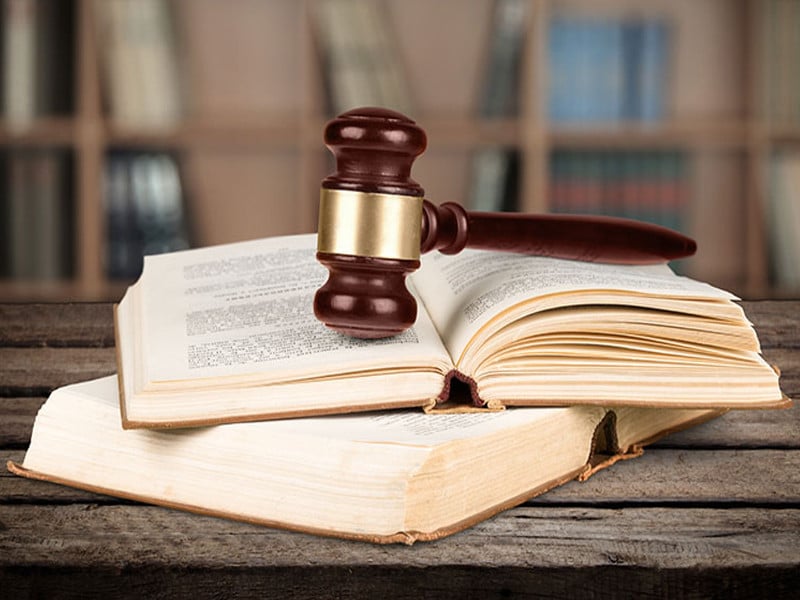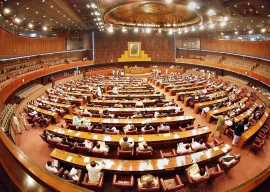
The federal government seems to have completed a clean sweep after successfully nominating seven judges of its choice for the Supreme Court's constitutional benches formed after the 26th Amendment.
A senior government official, defending the selection of judges by majority members of the Judicial Commission of Pakistan (JCP), said that Justice Ayesha Malik had also been nominated despite recent decisions against the present government.
He continued that the constitutional bench may take up petitions challenging the 26th Constitutional Amendment. Given the recent controversy, he said it was a challenge to nominate Justice Syed Mansoor Ali Shah and Justice Munib Akhtar for these benches and that the burden was now on the chosen seven judges to establish that they could work without being influenced.
Some lawyers have criticised Chief Justice of Pakistan (CJP) Yahya Afridi for not fixing the petitions challenging the 26th Amendment before a full court. A three-judge bench, led by Justice Aminuddin Khan and comprising Justice Jamal Khan Mandokhail and Justice Muhammad Ali Mazahar, will adjudicate constitutional matters.
Former Sindh High Court Bar Association (SHCBA) president Salahuddin Ahmed said the government's nominees on the judicial commission, with the support of Akhtar Hussain, the nominee of the Pakistan Bar Council, and the nominated judge himself, Justice Aminuddin Khan, had successfully implemented Rana Sanaullah's vision outlined last week.
"Henceforth, benches formed by the government shall hear cases against the government," he adds.
Moreover, the ex-SHCBA president said the fact that petitions against the 26th Amendment (with specific prayers against the functioning of the new JCP and the Constitutional Benches) had not been fixed on Monday despite a directive by a majority of the Supreme Court Practice & Procedure Committee indicated an 'utter capitulation before the powers that be'.
Senior lawyer Abdul Moiz Jaferii said that "mission judicial capture" was complete. "On top of the Supreme Court, the presiding judge of its constitutional benches is a man whose last constitutional opinion was that the government ought not to obey the Supreme Court," he added.
Jaferii stated that, after a hybrid democracy, we have welcomed a hybrid judiciary. "In commercial terms, the pillar of state known as the judiciary has been reduced to junk status. It is a frontier market. Every adjudicator thinking of fairness must also fear for their job," he continued.
Jaferii further said he believed that an effective judicial review of government actions would soon become a myth. "It will be little more than a bedtime story lawyers tell their children", he said.
Former additional attorney general Waqar Rana said that today's meeting of the JCP and its decision to appoint a constitutional bench comprising judges who ordinarily sat on the bench with former CJ Qazi Faiz Isa and concurred with his judgments, was expected.
"The forthcoming decisions of this constitutional bench are almost predictable. It is, therefore, most likely that over the next two months, some of the decisions, including the reserved seats case, will be reversed.
"It will certainly create an anomalous and most unprecedented situation in which judges will adjudicate appeals against their own decisions. This has rarely happened in the history of common law, and then only on the grounds of necessity. Here, however, it is political expediency that will remove the last signs of constitutionalism in Pakistan."
Justices Muhammad Ali Mazahar, Ayesha Malik and Hasan Azhar Rizvi had been signatories to the July 12 majority decision in the reserved seats case. The judgment is yet to be implemented, and review petitions against the majority order are still pending. It is worth recalling that eight judges in the reserved seats case had noted that Justice Aminuddin Khan and Justice Naeem Akhtar Afghan's observations undermined the integrity of the highest institution of justice in the country, and that they believed it even seemed to constitute an attempt to obstruct the process of the apex court and the administration of justice.
Another lawyer lamented that, for the first time, parliament was being used to sideline independent judges.















1730789969-0/Untitled-design-(98)1730789969-0-270x192.webp)








COMMENTS
Comments are moderated and generally will be posted if they are on-topic and not abusive.
For more information, please see our Comments FAQ